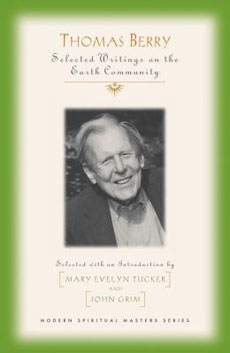Thomas Berry (1914 - 2009) was a priest, a historian of religions, and a "geologian." A pioneer in the advocacy of a "universe story" and the espousal of an Earth-based spirituality, he spent his life studying and teaching this big picture to all who would listen in church pews, library niches, college classrooms, retreat centers, and lecture halls around the world.
The editors of this volume in Orbis Book's Modern Spiritual Masters Series are Mary Evelyn Tucker and John Grim who are the co-directors of The Forum on Religion and Ecology at Yale. In the introduction, they summarize Berry's major interests and accomplishments in the study of the history of religions, the cosmologies within these religions, the search for connections between the human community and all life, and the creation of an evolutionary story to match the beauty and the bounties of the universe.
In nine chapters, the editors give us a crosscut of Berry's vision with essays on the spirituality of the earth, the universe as cosmic liturgy, the intercommunion of world religions, the challenge to Christianity, the Ecozoic Era, and moments of grace. Here is a sampler of reverence quotes from the book to give you a sense of the sweep and clout of the material:
• "Religion, we must remember, is born out of the sense of wonder and awe of the majesty and fearsomeness of the universe itself. The great decline in religion in industrialized countries can be attributed in large part to the loss of experience of the grandeur of the natural world, because of our newly acquired technological control over so many aspects of the natural world. At present, we are completely encompassed by the world of human artifice."
• "The ecological age fosters the deep awareness of the sacred presence within each reality of the universe. There is an awe and a reverence due to the stars in the heavens, the sun, and all heavenly bodies; to the seas and continents; to all living forms of trees and flowers; to the myriad expressions of life in the sea; to the animals of the forests and the birds of the air. To wantonly destroy a living species is to silence forever a divine voice."
• "If Earth does grow inhospitable toward human presence, it is primarily because we have lost our sense of courtesy toward Earth and its inhabitants, our sense of gratitude, our willingness to recognize the sacred character of habitat, our capacity for the awesome, for the numinous quality of every earthly reality."
Thomas Berry calls ecological living the Great Work of our time. He is right. Begin your inner work by reading this paperback from cover to cover and then continue your outer work by taking some ecological action. You are now on your way to practicing reverence day by day.
